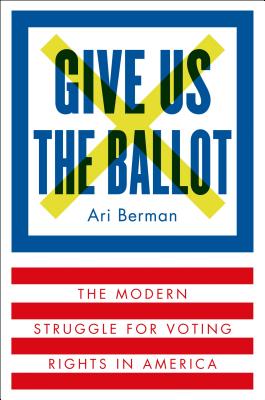Voting is power: A conversation with Ari Berman about the struggle for voting rights in America
The Nation contributing writer Ari Berman’s excellent new book Give Us the Ballot tracks the history of voting rights in America from the 1950s to today. No less a civil rights giant than Congressman John Lewis calls Berman’s history a “must-read” that “should become a primer for every American” on the topic of voting equality. (Lewis, of course, figures heavily into Ballot’s narrative.) This Friday, Berman appears in conversation with Supreme Court Justice Steven Gonzalez at Town Hall to talk about the state of voting rights nationally and in Washington State.

“I think turnout is always low for municipal elections, and I’m not sure that’s the best barometer” for a healthy democracy, he explains over the phone. Colorado’s vote-by-mail system is more successful, he says, because it provides many locations around the state where voters can drop off ballots, as opposed to Washington’s limited ballot drop locations. But he promotes one particular type of voting reform more than any other: “States that have same-day voter registration tend to have higher voter turnout. I think that, more than any other single reform, same-day registration has boosted voter turnout in a lot of places.” (Automatic voter registration has been discussed in Washington, but it doesn't appear to be moving forward.)
One of the main talking points that politicians use to discriminate against minorities at the polls is the idea of voter fraud. “I think that there’s a right-wing echo chamber that has sustained the voter fraud myth for a long time,” Berman says. That consistent push to promote fraud completely ignores the idea of “how rare it is,” he explains — “particularly voter impersonation,” which is the most-discussed type of fraud, but which is in reality “exceedingly rare.” How rare? “There have been a billion votes cast since 2001” Berman says, but only 31 cases of voter fraud.
We’ve seen very little positive movement on voting rights on a national level, but several states are experimenting with laws of their own. Local organizations are promoting the Washington Voting Rights Act, which is modeled on a successful California voter protection law. But that’s not enough. “The state’s voting rights acts are interesting constructs, but they’re no replacement for federal protection,” Berman warns. He understands the reason why they’re necessary—on a federal level, ”you not only have a hostile Congress but you have a hostile Supreme Court,” which requires states to take on the role of “laboratories of innovation.”
Ask Berman if he has any advice for people who haven’t yet voted today, and his answer will likely surprise you. Local elections, he says, matter a lot — local positions are how we get into government in the first place, and a voter rights act in Yakima might lead to the election of the city's first Latino candidate to the City Council today. But Berman says “I don’t want to rag on people who don’t vote in municipal elections because we have a lot of elections in this country—probably way too many.” Berman says the onslaught of mailers and phone calls and television ads never stops because we have elections every year. He believes that “at the very least every two years should be enough.”
Though he can certainly understand voter fatigue, Berman is a big believer in the importance of voting. When confronted by people who believe that their votes don’t matter, Berman replies, “if their vote didn’t change anything, then why try to restrict voting rights? Clearly, that’s a sign that voting does matter—that people have tried to restrict it throughout history.” Further, “if you don’t vote, it’s not like you’ve gained power. You have less power, you’ve ceded your power to someone else, and they’re going to have more power than you after that.” On a day when every single city council position in Seattle is being decided, the balance of power rests with the people. How you vote — or even if you vote — will determine where that power goes.